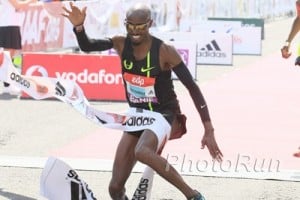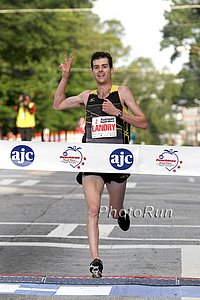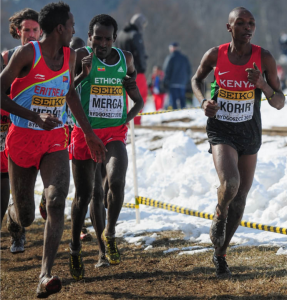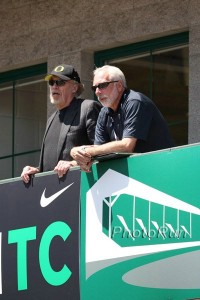Mo Farah Answers The Critics, David Rudisha Goes Sub-1:45, Road Racing Returns To TV, And The South Koreans Want To Import An EPO Cheat
by LetsRun.com
March 25, 2015
Previous versions of The Week That Was – our weekly recap – can be found here.
Questions, comments, please email us or post them in our running fan forum.
After the week before saw the NCAA champs, the United Airlines NYC Half Marathon, and the Asics LA Marathon (USA Champs), this week scaled things down a bit, but had a huge half-marathon match-up in Lisbon with Mo Farah running. We take that on first, then provide updates on the London Marathon and David Rudisha, discuss road racing’s return to U.S. television and tell you which NCAA schools have the lightest penalties for steroids.
****
Thumbs Up Mo Farah aka Mo Farah Shuts Up Some Of His Critics
No one can criticize Mo Farah‘s performances on the track since 2011. He’s been virtually unbeatable. Thus, the criticism has become Farah ducks the competition unless it’s the world championships, he doesn’t go after fast times, he can’t run that well on the roads.
Farah took care of two of those criticisms this past weekend in Lisbon by winning the EDP Lisbon Half Marathon in a European record of 59:32.
A very impressive performance that deserves praise. Farah deserves the most praise for showing up and facing some of the world’s best on a surface and at a distance that are not his best. For the sport to thrive, it needs the world’s best competing as often as possible and that is exactly what Farah did.
What does this mean for Farah’s future at the half marathon? It doesn’t change our assessment that much. Beforehand, we wondered what would happen to Farah if the field went out at a world record pace because we didn’t feel the world record was in Farah’s wheelhouse right now. The splits in Lisbon do not appear to be very accurate, so we can’t tell the exact pace the field went out in, but Farah realized the pace was too fast for him and let the leaders go. Farah kept running hard and stormed to the come-from-behind victory, showing he is one of the best half-marathoners in the world. Coming from behind to win a race like that when three guys are clear of you in front is unusual and very impressive.
Mo Farah is the best track runner in the world, one of the best half-marathoners, and silencing some of his critics in 2015 (he previously broke the “soft” 2-mile indoor world record in his last race out).
****
Spain’s Fabian Roncero, the previous European half-marathon record holder, spouted his mouth by saying Farah’s record “is the record for Somalia.” You can read more of his enlightened comments here. Fabian needs to get over it. The European record is the time by the fastest person who is a citizen of Europe. Mo Farah may have been born in Somalia, but he is a Brit now. Sure people can talk about the fastest times by people born in Europe or not of African descent because genetics likely plays a role, but Farah is the European record holder, end of story.
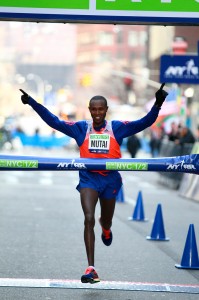 Geoffrey Mutai of Kenya wins the 2014 NYC Half in 1:00:50. (PhotoRun/NYRR)
Geoffrey Mutai of Kenya wins the 2014 NYC Half in 1:00:50. (PhotoRun/NYRR)
London Marathon Loses Bekele, Picks Up Geoffrey Mutai
The Virgin London Marathon has the strongest pro fields in the world every year. This year’s London field was looking to be arguably the greatest men’s field ever assembled with last year’s world #1 Wilson Kipsang facing the world record holder Dennis Kimetto and world #2 Eliud Kipchoge plus world 10,000m record holder Kenenisa Bekele.
Last week, it was announced that Bekele will not run London — which would have been his third marathon in six months — because of an Achilles injury. London easily could have sat on its laurels and just pocketed Bekele’s appearance fee. What did it do instead? Go out and sign up Geoffrey Mutai, who has won New York (twice), Boston and Berlin and has run 2:03:02. Well done.
*Everything 2015 London Marathon Here
David Rudisha Challenged in Australia
World record holder David Rudisha ran his second 800m race in two weeks in Australia this past weekend and broke 1:45 for the first time in 2015 to win in Melbourne, running 1:44.94 and holding off a strong challenge from Jeff Riseley who ran 1:45.29. Watch the race (set to start at the last lap) below:
1:44.94 might seem like a good time, but Rudisha has run much faster in years past when he has opened up in Australia. In 2012, his first 800 was a 1:44:33 in Melbourne, in 2011 he ran 1:43.88 in his opener in Melbourne, and in 2010 he ran 1:43.15 to open in Melbourne. It’s also not a good sign that a 1:44 guy in Riseley was pushing Rudisha to the line. So there is work to be done.
The good news is the weather wasn’t good in Australia and Rudisha is known for not running well in bad weather, and his coach realizes they still have a long way to go:
*Brother Colm O’Connell is upbeat about Rudisha, but says there is lots of work do  MB: Bro Colm O’Connell talks about Rudisha: “It was cold, blistery and windy…he is moving in the right direction”
MB: Bro Colm O’Connell talks about Rudisha: “It was cold, blistery and windy…he is moving in the right direction”
LRC David Rudisha Is Surprisingly Challenged To The Finish, Improves To 1:44.94 In Melbourne
Road Racing Returns to TV in the USA
Last week we had a brief mention on the homepage that the AJC Peachtree Road Race on July 4 in Atlanta will have a new team format this year instead of being the USA Championships for 10k. The inaugural “Peachtree Cup” will have teams from the U.S., Africa, Asia and Europe, with six runners per team (three men, three women) competing for $81,000 in team prize money and $98,500 in prize money overall (how about bumping it to $100k?)
However, we think the big news wasn’t mentioned at all in the press release. With the new team format, Peachtree will be on national TV for one hour this year. It won’t be live, but there will be a one-hour broadcast on July 6 on NBC Sports Network. That is great news and props to Peachtree and USATF working together to making this happen. The sport needs to reach new fans and it doesn’t do that streaming to the diehards on the Internet. There used to be a show with Toni Reavis, Road Race of the Month, on ESPN that inspired us to become diehard fans of the sport. Glad to see road racing once again will be on TV in the U.S. (Peachtree has always been on local tv in Atlanta, and will have 4 hours live with a primetime recap show in Atlanta)
Full disclosure: Peachtree was advertising its race registration lottery last week on LetsRun.com (it’s too late now to register for this year’s race). This blurb above is not part of any advertising package, but fortunately they did advertise because in talking to race director Rich Kenah we found out about the TV deal.
No Shame in South Korea?
EPO cheat Wilson Loyanae won the Seoul Marathon last weekend in 2:06:11 in his first race back from his drug ban. We wondered why the event would welcome back an EPO cheat, but apparently the South Koreans have a much stronger connection to Loyanae than we thought, as later in the week it came out the South Koreans plan to give Loyanae citizenship so he can win gold for them at the Rio Olympics. If we made that up you wouldn’t believe us. Shame on South Korea.
And while we said above Mo Farah has the European record for the half marathon, we don’t think athletes should be able to switch citizenship for athletic reasons.
*South Korea Plans To Give Citizenship To Kenyan Marathoner Wilson Loyanae Erupe To Ensure Marathon Gold At Rio Olympics *Discuss
****
Quote of the Weeks (That Weren’t Quote of the Day)
I – Steroid Users, When Choosing A College, Make Sure You Pick The One With The Lightest Doping Penalties (Stanford Is A Good Place To Start)
“A first-time steroid infraction would bench a Florida (football) player for half the season but cost a Texas A&M player only a single game. Private schools such as Vanderbilt, meanwhile, aren’t required to share their drug-testing policies with anyone, not even the NCAA.”
– excerpt from a Wall Street Journal article on drug testing by individual NCAA schools.
One could argue that some schools like A&M do the drug testing so they know which players need to get their doping under control so they NCAA doesn’t nail them and hand them its one-year ban for a first offense. Of course, others would argue, at least A&M tests its own athletes. Stanford doesn’t even bother.
The good news is the NCAA’s chief medical officer Brian Hainline comes across as a hero in the article. He is a renegade who is vehemently anti-PED as shown by these quotes:
II – Ethiopian and Kenya are Utterly Dominant
“Ethiopia and Kenya are to long distance running what New Zealand is to rugby, or Jamaica is to sprinting: utterly dominant. In Ethiopia, support for the sport is almost religious in its fervour. You know the names: Abebe Bikila, Tirunesh Dibaba, Kenenisa Bekele and, of course, the emperor himself, Haile Gebrselassie. At one point or another, they all trained on the Meskel Square steps, and Ethiopia’s new crop of Olympic hopefuls still do.”
– excerpt from a piece by Simon Allison, writing about Meskel Square, the ceremonial home of Ethiopian distance running.
III – Words of wisdom from an 18-year-old – “If you want to achieve anything in your life, you have to commit to it”
“As it happens I was out for the first time just at the weekend there, just passing a ball about with my dad, watching a football game, and it was brilliant. I do miss playing football but if you want to achieve anything in your life, you have to commit to it. I don’t mind now, because the results are coming.”
– 18-year-old British junior XC champ Jonny Glen, talking to Heraldscotland.com about how he had to give up his love for football (soccer) to achieve his dreams in running. Glen is headed to China this week (as is LetsRun.com) for the 2015 IAAF World Cross Country Championships.
We loved Glen’s quote because he’s very much aware that in life, where we are all limited by time, everything has a tradeoff. Glen, who is in the midst of an electrician apprenticeship in addition to running, realizes it way better than most 18-year-olds.
So many college kids like to complain about the “sacrifice” that running requires. “We can’t party like other kids,” they say.
Few realize that a) everything of note in life requires some sacrifice and b) the sacrifice results in a lot of benefits.
When LetsRun.com co-founder Robert Johnson was coaching at Cornell and encountered a runner complaining about how hard it was to be a runner he’d reply, “Well other kids don’t get into Cornell with a 1300 on their SAT and don’t have Cornell pay to send you to California for a week on spring break either.”
IV – USATF’s primary focus is making money for USATF.
“My opinion is that USATF’s primary focus is making money for USATF. Their leadership thinks that in doing so they are doing their job to support athletes by letting a tiny fraction of their earnings trickle down to the pros. In reality, they have confiscated advertising space that belongs to us, sold it to the highest bidder, and are now stuffing their pockets with money that we, the athletes have earned.
“The worst example of this is the 20+ year deal that they recently signed with Nike. If USATF cared about the professional athletes, they would not have signed such a long contract. In fact, if they really cared about all of the athletes they would not sign contracts with endemic sponsors in the first place as it is a huge conflict of interest.”
– Nick Symmonds talking about USATF in an interview with therunnerdad.com.
We, like Nick, believe that signing the 24-year deal was a mistake, but for different reasons.
Our beef is the length of the deal and the fact that it wasn’t bid out. (We understand the concerns of using an endemic sponsor, but a non-apparel sponsor isn’t going to pay the amount of money an apparel sponsor is)
We have spoken to Spencer Nel, head of track and field/running at adidas who said they would have been interested in bidding on the deal but were not giving the chance. Under Armour is trying to break into footwear sales in the U.S. and would presumably liked to sponsor Team USA (we have not spoken to anyone at Under Armour about this deal). The marketplace for such deals has increased tremendously and by not bidding it out there is the chance USATF left money on the table.
As for Symmonds saying the money doesn’t go to the athletes, that doesn’t have to be the case. We believe a huge percentage (80%+) of USATF’s Nike sponsorship money should go to elites as Nike sponsors USATF for one main reason – to have their logo on the elites’ jerseys at the Olympics.
We’ll talk more about this later, but USATF needs to be more transparent on what the value of this deal is so the athletes can get their fair share.
We do know one thing about the USATF/Nike deal that is very much in agreement with Symmonds’ quote. It is fantastic for the current USATF management. Since their budget has doubled, they don’t have to worry about scrimping to cover the bills every year, they can say ‘Hey, we’re doing a great job financially’, they can put on their résumé that they helped double the budget, and in 10 or 20 years if it’s a horrible deal it will be someone else’s problem. All because they no-bid one that was about to expire.
Anyone in charge of USATF would have renegotiated the Nike deal once it expired. USATF is doing much better financially and the current leadership deserves praise for that, but let’s not pretend it is rocket science.
V – Ryan Hall Doesn’t Read The Internet Anymore
“I quickly realized what it (paying attention to online comments) did. And it’s amazing what sticks with you. There can be 20 positive comments, and the single negative comment is what you remember. So I don’t read the internet anymore.”
– Ryan Hall talking in a Toni Reavis piece on Hall, Ritzenhein and Webb that is a must read. The piece also includes a quote from coach Bob Larsen who says he thinks Hall could have run “close to 2:10 (in the marathon)” in HS (MB:Bob Larsen on Ryan Hall: “I think he could have run close to a 2:10 (marathon) in high school.“) and reveals that when Hall ran 2:04 in Boston, his buildup had been “abysmal.”
If you are looking for a weekly free coaching tip, that’s it for this week. When you are older, sometimes you can race really well despite having a horrible training cycle. In 2003, LetsRun.com co-founder Weldon Johnson was fourth at USAs in the 10,000 in his 28:06 pb after running just 28:54 six weeks before.
VI – Ryan Hall Talks Training With the New Yorker
“The truth of the matter is you can only have your best day ever once in your life, you know what I mean? And yeah, you can keep having a better day than you ever have before for a while, but eventually, we’re all human and we’re all gonna get worse. You can only have your best day ever once. So if all you’re gonna do is compare your best day ever to every other day, you’re just gonna be disappointed for 99.9 per cent of your life. That’s just the logistics of it.”
–Ryan Hall speaking to the New Yorker in a recommended read on his “philosophy” before The LA Marathon
****
Stat of the Week I
2.61 billion – combined population of China and India in 2013.
36.6% – percent of world’s population that comes from India/China.
| National Records for Men’s Track | |
| China | India |
| 1:46.32 | 1:45.77 |
| 3:36.49 | 3:38.00 |
| 7:56.19 | 7:50.31 |
| 13:25.14 | 13:29.70 |
| 28:08.67 | 28:02.89 |
| 62:51 | 64:00 |
| 2:08:15 | 2:12:00 |
****
Stat of the Week II
12 – number of years before Oregon coach Bill Dellinger drew more than 5,000 fans to an Oregon home meet.
The stat comes from a great piece by Jesse Squire in the Daily Relay where he argues collegiate coaches can play a huge role in growing the sport.
****
Recommended Reads Not Mentioned Above
****
Quotes Of The Day And Last Week’s Home Pages
To see the actual quotes of the day from last week or last week’s home page or any home page, go to our archive page.
Questions, comments, please email us or post them in our running fan forum.
